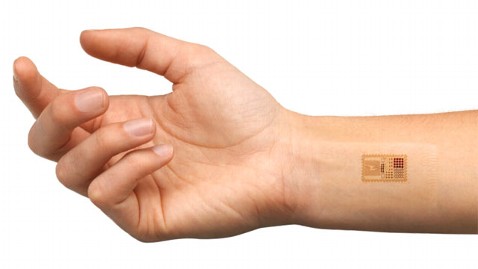Medical Tattoo Looks to Replace Bulky Devices
 (Courtesy: MC10)
(Courtesy: MC10) WASHINGTON - Gone may be the days of substantial and at times clunky medical objects like a hard metal pacemaker placed next to the heart or electrodes implanted within the brain.
Our bodies should not have to handle such bulky medical devices, David Icke, CEO of the electronic systems company MC10, told the audience today at the TedMed Conference in Washington, D.C.
"What if electronics were soft and pliable? What if electronics conformed to us, instead of us conforming to them," Icke said.
Icke and his colleagues created a sticky patch he called a "biostamp." It's as thin and flexible as a sticker that, when placed anywhere on or under the skin, can monitor your disease, detect changes in your body or even just simply keep up with your vital signs.
"Imagine for your kids playing contact sports, to be able to gauge impact to their head," he said.
Icke said the patch can work as an early warning to changes in performance or motion.
The tattoo is still in the research phase but Icke said his research team is already looking for new uses for it.
Icke told the crowd he would like to expand the use of the tattoo, even perhaps as "smart catheters" that can be placed deep into the heart that can sync with a smartphone for up-to-the-minute results of irregular heartbeats.
The researchers are also looking into having the patch encase the brain of epilepsy patients and ultimately replace electrodes to monitor seizures.